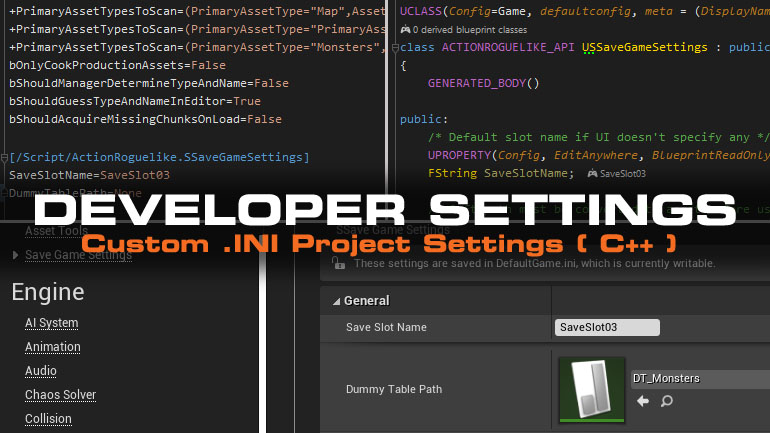Using C++ Timers in Unreal Engine
Timers are incredibly helpful for gameplay programming in Unreal Engine. However, the syntax can be a little tricky if you’re unfamiliar with C++. This blog post will cover all the essential features and syntax for using C++ timers effectively in your game.
For code examples of timers, check out my C++ Action Roguelike - I will use this project source in a variety of examples below. Timers as part of game performance are covered in my game optimization course. More on that later.
Set Timer
You set timers through the global timer manager which is available through GetWorld()->GetTimerManager() or the shorthand available in any Actor, GetWorldTimerManager() which returns the same timer manager. There are a couple of overloads (function variations) available to pass the function to execute, the interval between triggers (if looped), a flag to enable looping, and the optional first delay. You can also set a timer to run the next frame by calling SetTimerForNextTick().
Setting a timer can be pretty straightforward. Here is an example from an Explosive Barrel class to delay the explosion after getting hit by a projectile:
/* Activate the fuze to explode the bomb after several seconds */
void ARogueExplosiveBarrel::OnHealthAttributeChanged(...)
{
GetWorldTimerManager().SetTimer(
DelayedExplosionHandle, // timer handle in case we want to pause or cancel
this, // owning object, we clear the timer when this object is destroyed
&ThisClass::Explode, // function to call when time elapsed
ExplosionDelayTime // looping?
);
}
In the example, the FTimerHandle is defined in the header file. You are not required to keep a reference to the handle, but keep a reference to it when you need to pause or cancel the timer.
/* Handle to manage the timer */
FTimerHandle DelayedExplosionHandle;
The function Explode() has no parameters in this example. To pass along parameters on timer elapsed, there is a different way to bind the function…
Using SetTimer() on a Function with Parameters
It’s possible to pass parameters into timer functions (delegates). The example is from Action Roguelike’s Projectile Attack. In this case, we bind function through a FTimerDelegate and pass the delegate into the SetTimer function.
FTimerHandle TimerHandle_AttackDelay;
FTimerDelegate Delegate;
Delegate.BindUObject(this, &ThisClass::AttackDelay_Elapsed, Character); // 'Character' is the parameter to pass in, this will be available in the AttackDelay_Elapsed function (see below)
GetWorld()->GetTimerManager().SetTimer(TimerHandle_AttackDelay, Delegate, AttackAnimDelay, false);
void AttackDelay_Elapsed(ACharacter* InstigatorCharacter);
Clearing Timer(s)
When destroying or deactivating objects, make sure you clear any active timers. There are two ways of dealing with timer removal. You don’t need to do this for timers that have elapsed and aren’t looping.
void ARogueBombActor::EndPlay(const EEndPlayReason::Type EndPlayReason)
{
Super::EndPlay(EndPlayReason);
// Ensure the fuze timer is cleared by using the timer handle
GetWorld()->GetTimerManager().ClearTimer(FuzeTimerHandle);
// Alternatively you can clear ALL timers that belong to this (Actor) instance.
GetWorld()->GetTimerManager().ClearAllTimersForObject(this);
}
Debugging & Profiling
You can dump the currently active timers by using the listtimers console command. You can also dump expensive timer functions to the log by setting TimerManager.DumpTimerLogsThreshold to anything higher than 0 (where the number is the time threshold in seconds)
When does it Tick?
The TickManager itself ticks between TickGroups. Specifically, between PostPhysics and PostUpdateWork. That’s relatively late in the GameThread frame. Keep this in mind for any potential dependencies as you might introduce a one-frame delay if implicit dependent objects have already ticked that frame.
Advanced Considerations
There are a couple of things to consider that aren’t immediately obvious and/or are more relevant once you are optimizing your game.
High-Frequency Timers
It’s important to note that while you can run very high-frequency timers, these do not actually run asynchronously or on a higher ‘real’ framerate than your game. Let’s say your game runs on 60 FPS and you have a timer on 0.005 looping intervals. That’s about 200 times per second, internally it will still run approx. 200 times per second even at 60 frames per second! It’s important to realize though that this will execute multiple times in a loop, immediately after each other, and NOT spaced out smoothly every 0.005.
It will instead run about 3 times per frame in a burst, which is just a waste of execution and could be done 1 time per frame with a higher DeltaTime to compensate.
New in 5.4: ‘Max Once Per Frame’ to avoid the catch-up behavior where the timer may be called multiple times per frame.

In C++ this is available too of course, but is a bit more hidden inside FTimerManagerTimerParameters with bMaxOncePerFrame. Here is the example usage I could find in the engine:
// Example found in UKismetSystemLibrary::K2_SetTimerDelegate
TimerManager.SetTimer(Handle, Delegate, Time,
FTimerManagerTimerParameters { .bLoop = bLooping, .bMaxOncePerFrame = bMaxOncePerFrame }); // Creates the FTimerManagerTimerParameters struct inline
Frame Pacing
You should never use TickManager as an excuse to not optimize badly performing code or naturally expensive operations. Running them as timer functions on a lower frequency may cause an instable framerate rather than smooth performance which hinders player experience. There are a couple of alternatives such as time slicing (spreading the workload across multiple frames) or running the entire function asynchronous using Unreal’s Task System.
(Lack of) CPU Cache
If you are updating many of the same objects using the TickManager using individual timers, you have no control over their execution order. Much like Unreal’s standard Ticking system. There are enormous performance benefits to maximizing the CPU instruction and data cache. While this is out of the scope of this article, the most relevant resource to learn more is UnrealFest’s Aggregating Ticks to Manage Scale in Sea of Thieves. Consider combining many small timer functions into a single manager to maximize performance.
Closing
Timers are great for triggering delayed events and handling other time-based events that you may be inclined to put in your Tick() function instead. Be mindful to not abuse this convenient solution in places where you really need a more well considered system.
Interested to learn more in-depth about performance & optimization concepts like timers, tickgroups, frame pacing, cpu cache, and many more? I just launched my Complete Game Optimization Course for Unreal Engine 5!
Check out the API for FTimerManager API Documentation for more useful functions on timers. Including time remaining, finding the tick rate, active timers, pause/continue, etc.


